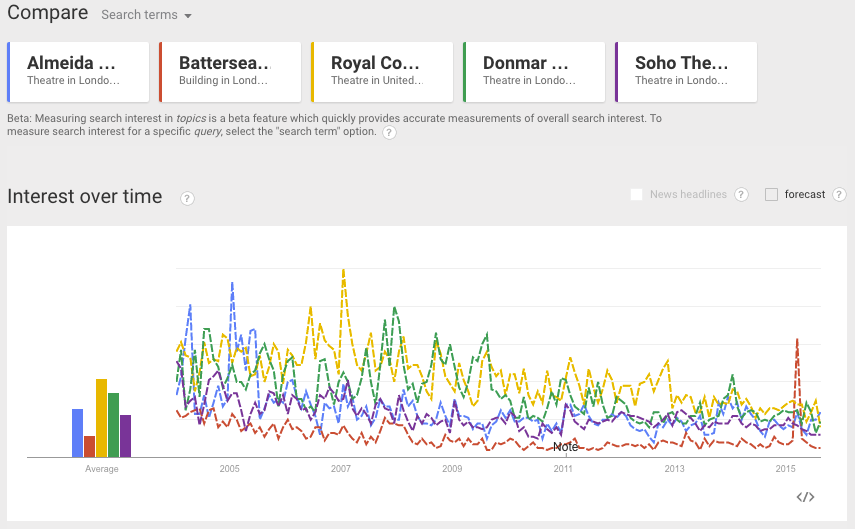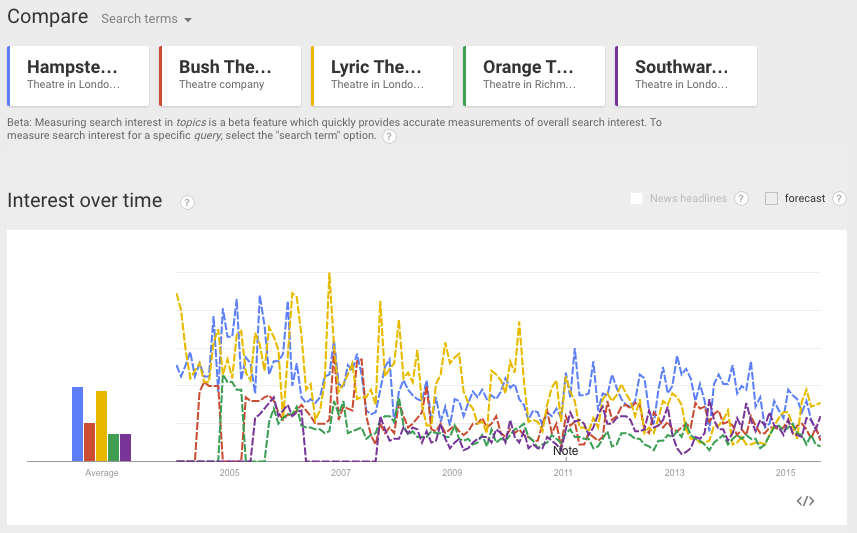Back in February 2015, the Warwick Commission on Cultural Value published the results of their year-long investigation. Will Perrin spoke to them about digital issues in the British cultural scene and philanthropy and produced an evidence paper back in Jan 2014 that I’ve only recently got round to reading.
I’m glad I finally did, though. This post is a summary of that paper with some of my own thoughts thrown in.
Will’s conclusion is that:
I am struck that the arts seems to be sleep walking along in the comfort zone of an analogue world, guided by boards of people at the end of their professional careers who are not of a digital generation. To stay relevant arts leadership needs a revolutionary approach to digital issues, particularly leadership – their slow pace of evolution risks them being left behind.
There are quite a few good quotes in the piece, with references to some good sources. It’s not often I recommend reading the minutes of a meeting, but those from the ACE National Council Meeting (the one with all the top dogs) on 14 November 2013 but there you go. Will says that they “don’t show any sense of urgency to embrace digital media”.
GDS for the arts?
One of the things Will spoke about was how Martha Lane-Fox’s Directgov 2010 and beyond report, and Francis Maude’s adoption of it, led to the creation of:
a new team, Government Digital Service with the right talent, the right bureaucratic levers and, critically, buy-in from bureaucratic leaders too. Martha and Francis clearly and demonstrably put digital leadership front and centre in the government’s reform programme and made it vital to the future of government services and administration, going well beyond ‘digital corner’.
Will says that he “can’t quite see an analog to this process in the cultural sector”. Me neither, and I don’t think such a thing could exist in quite the same way. After all, the Cabinet Office had the authority to set up GDS and was given a remit to effect some far-reaching changes, with cost-savings estimated to be in the billions (which provided a nice imperative).
In contrast, neither ACE, DCMS, nor any of the other funders are in a position to create an ‘Arts Digital Service’ and have that team centralise the approach to digital activity for large swathes of the arts organisations in its portfolio. Those funders are important, but they’re not in a position of ownership, and portfolio funding isn’t a given – it could be taken away at any point,
Still, it’s worth thinking about the lessons that can be taken from things like GDS. Let’s take the three things Will picks out as being important to GDS’s success:
1. the right talent
I take this to refer to two things:
- digital talent at board level
- digital talent at executive level
First up, ‘digital’ people on arts boards. I wonder if someone’s investigated this and seen how much change it enables/catalyses. I know that at least a few of the orgs I’ve worked with have people from big tech (mostly software, gaming and online retail) companies on their boards, but I don’t know how common that is. I suspect not very.
At this point, I should bring in Will’s take on all of this:
A cursory examination of boards that govern arts institutions at all levels shows few clearly digital people. And Antony Lilley deserves a knighthood for the number of times he is wheeled out at events as a friendly digital person. From a tech sector perspective, the heavy reliance on the broadcasters as founts of digital wisdom seems odd – their technologies are inappropriate for the vast majority of arts organisations.
He’s bang on with the broadcasters thing. And remember that Building Digital Capacity in the Arts thing with the BBC Academy? The next partners working with ACE will be the BBC, Channel 4, the BFI, The Knowledge Transfer Network, Technology Strategy Board, and Google, with all sorts of talk about film making and cinema distribution. Which is fine, but… hmm, I’m at risk of going off on one here.
The second thing is talent working within the organisations. I’m not sure what I want to say about this, other than to say that there’s not a lot to go round. The bigger organisations are able to employ good people to fill digital-focussed roles, although hanging on to them seems to be an emerging issue. On the other hand, in medium and smaller organisations, digital is much more likely to be incidental to other roles (and not in a good way). They tend to be junior roles, too. I realise here that I’m just thinking about back-office functions. There’s a whole other question about the artistic side of things.
2. the right bureaucratic levers
To some extent this goes back to what I was saying about arts funders not being able to magic up a GDS. However, there are levers that can be pulled. Thing is, as things stand, I don’t think support and funding (to name two of those levers) are being pulled in entirely the right directions.
Also worth referring back to the minutes from the ACE National Council Meeting Will pointed out.
3. buy-in from bureaucratic leaders
We hear plenty of nice words, and money is being spent in the direction of digital stuff (the R&D Fund, The Space, Canvas), but I do wonder how much the people in charge of those levers see an urgent issue that needs addressing. Is it even their job? Should it be?
Maybe the issue is that few people see a problem in need of fixing. As I said with GDS, there was a clear financial imperative and a recognition that the user experience needed to be fixed. Nobody’s claiming that queuing at the Post Office to pay your car tax is the true, authentic experience.
On the other hand, it’s not so clear that digital transformation is either going to significantly reduce costs or bring in untold riches. The only thing that’s being missed out on is the more nebulous concept of ‘opportunity’, and there are many people who are adamant that the core experience (the concert, the theatrical production, etc) is just fine and a shift towards a more digital presentation would be a terrible thing.
So there we go. In conclusion, it’s worth reading Will Perrin’s thoughts and having a think.
Oh, and it’s also worth pointing out that the other half of Will’s submission had to do with transparency in grant giving. ACE have since announced plans to share more of their data. Which is good.



